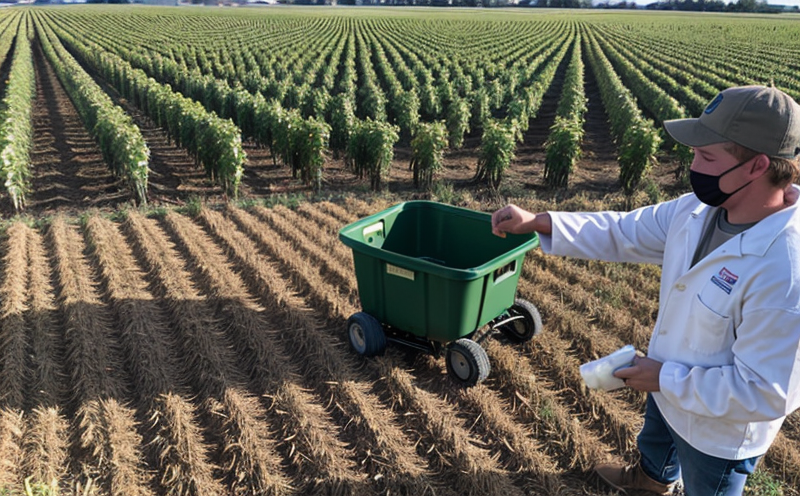Moisture Content Testing in Harvested Crops
In agriculture and forestry testing, moisture content testing is a critical process that ensures harvested crops are processed efficiently and stored safely. Moisture content directly affects the quality, shelf life, and economic value of agricultural products. Accurate measurement of moisture content helps in determining the optimal time for harvesting, drying, or storage.
The importance of moisture content testing cannot be overstated. Excess moisture can lead to mold growth, spoilage, and degradation of nutritional value, while insufficient moisture may result in brittle materials that are prone to cracking during processing. In the context of post-harvest quality testing, moisture content is a key parameter that influences the overall handling and commercialization of crops.
For instance, grains such as wheat, corn, and rice have specific moisture content limits for safe storage and transportation. According to international standards like ISO 3250-1:2018, moisture content in grain should not exceed 14% for long-term storage or 13% for short-term storage. Exceeding these limits can lead to significant economic losses due to increased spoilage rates.
Post-harvest testing involves a series of steps that include sample collection, preparation, and analysis using various instruments such as infrared moisture analyzers, near-infrared spectrometers (NIRS), and oven drying methods. These tools provide precise measurements necessary for quality control in the agricultural sector.
In summary, moisture content testing is essential to ensure optimal crop handling practices, compliance with international standards, and the prevention of economic losses due to spoilage or degradation.
- Ensures safe storage
- Avoids mold growth and spoilage
- Enhances shelf life
- Promotes efficient processing
- Complies with international standards (ISO 3250-1:2018)
- Prevents economic losses due to degradation
Benefits
The benefits of moisture content testing in harvested crops are manifold. Firstly, it ensures that the harvested products meet quality standards and can be safely stored or transported without risk of spoilage. This is particularly important for grains, nuts, fruits, and vegetables which have specific moisture content limits.
Secondly, accurate moisture content testing helps in optimizing processing times and methods. For example, knowing the exact moisture levels allows for better drying processes, reducing energy costs and improving efficiency. It also aids in determining the appropriate storage conditions to maintain product quality over time.
A third advantage is improved economic efficiency. By minimizing losses due to spoilage or degradation, farmers and processors can maximize their returns on investment. This is especially crucial in industries where even small reductions in waste can have significant financial impacts.
Compliance with international standards further enhances the reputation of agricultural products on global markets. International organizations such as ISO (International Organization for Standardization) provide guidelines that ensure consistency across different regions, promoting fair trade practices and market access.
In conclusion, moisture content testing provides a range of benefits including improved product quality, optimized processing methods, reduced waste, enhanced economic efficiency, and compliance with international standards. These factors contribute to the overall sustainability and profitability of agricultural operations.
Why Choose This Test
- Precision Measurement: Our moisture content testing uses advanced instrumentation like near-infrared spectrometers (NIRS) for precise, non-destructive analysis. This ensures accurate results every time.
- Compliance Assurance: We adhere strictly to international standards such as ISO 3250-1:2018, ensuring that your crops meet quality and safety requirements.
- Efficiency: By providing quick turnaround times for test results, we help you make timely decisions regarding storage, processing, or sale of your crops.
- Expertise: Our team comprises highly skilled technicians with extensive experience in agricultural testing. They bring a wealth of knowledge to each project they undertake.
- Cost-Effective: While maintaining high standards of accuracy and reliability, our services offer competitive pricing that does not compromise on quality.
Selecting moisture content testing from us means choosing a partner committed to excellence. We are dedicated to providing reliable, accurate, and timely results that contribute to the success of your agricultural operations.
Quality and Reliability Assurance
At our laboratory, we take pride in maintaining stringent quality control measures at every stage of moisture content testing. Our processes are designed to ensure high reliability and accuracy, meeting or exceeding international standards such as ISO 3250-1:2018.
The process begins with the collection of representative samples from various parts of the harvested crop. These samples undergo rigorous preparation steps to ensure they are free from contamination and are suitable for testing. Next comes the actual measurement using our state-of-the-art instruments, which provide precise readings that are then analyzed by our experts.
We employ a multi-step verification process to confirm the accuracy of each reading. This includes cross-referencing results with known standards and conducting additional checks where necessary. Our goal is not only to meet but exceed client expectations in terms of reliability and precision.
Our commitment to quality extends beyond just testing. We offer continuous training for our staff, regular calibration of equipment, and adherence to best practices in sample handling and storage. By doing so, we ensure that every test conducted at our laboratory is as accurate and reliable as possible.





